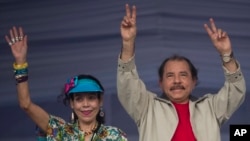Nicaraguan President Daniel Ortega is actively closing the country’s democratic space in the run up to the November presidential and legislative elections. Beyond silencing the political discourse and competition necessary for a vibrant democracy, such actions could have a stifling effect on Nicaragua’s prosperity and international standing.
On June 8, the Nicaraguan Supreme Court, comprised of Ortega loyalists, stripped the opposition Independent Liberal Party from its long-recognized leader Eduardo Montealegre. It took similar action on June 17 when it invalidated the leadership of the Citizen Action Party, another opposition party with the legal standing to present a presidential candidate.
Then, on July 28, the Supreme Electoral Council removed 28 Independent Liberal Party national assembly members from their popularly–elected positions. The lawmakers decried the decision as a destruction of “Nicaragua’s already debilitated representative democracy by closing the last institutional space for the opposition.”
Other parties, like the Sandinista Renovation Movement, called the council’s decision “a new blow to completely liquidate political pluralism and to eliminate the opposition voices in parliament and public institutions that have played an important role in denouncing Ortega’s abuses of power.”
Most recently, on August 2, the president named first lady Rosario Murillo as his running mate in the November 2016 presidential elections. Murillo is viewed by many in Nicaraguan society as wielding substantial power and speculation is that this has the potential of creating a family dynasty.
President Ortega, who is running for a third consecutive term, says that he will not allow international election monitoring in November, despite polls showing that a vast majority of Nicaraguans believe that international observation would add credibility to the electoral process.
“Credible elections and political plurality are fundamental to any strong democracy,” said U.S. State Department Spokesperson John Kirby. “Nicaraguan civil society, business leaders, and religious leaders continue to advocate for a strengthening of democratic institutions, a separation of powers, and a fair electoral process.”
The United States calls on the Nicaraguan government to respect the voices of its people and take the steps for fair and transparent elections that permit the full participation of all Nicaraguan citizens, including by allowing opposition parties to operate independently and by inviting the presence of international election observers. Without such steps, the credibility of the upcoming election will likely be questioned by many voices domestically and internationally.














